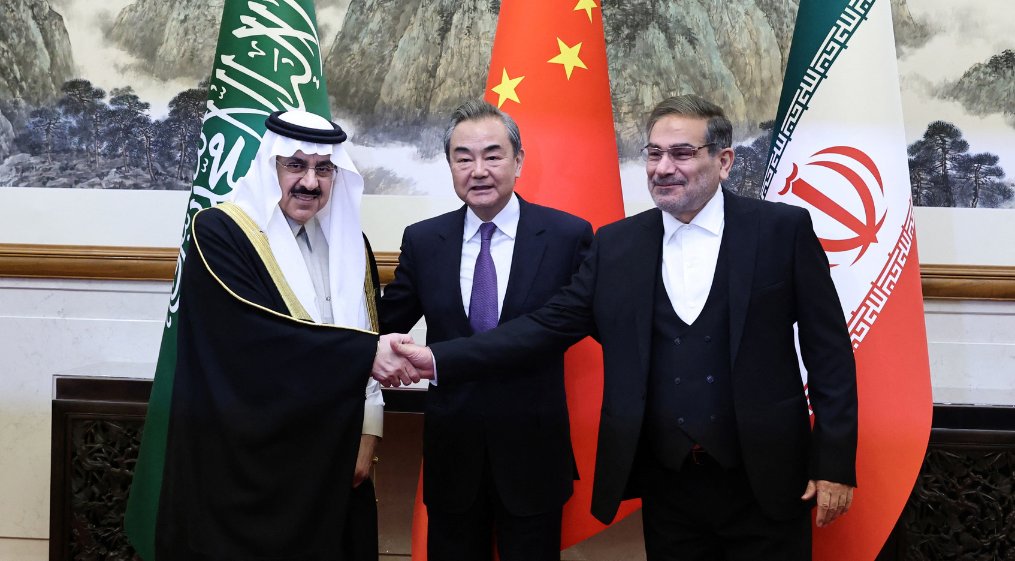Australia/Israel Review
What’s behind the Riyadh-Teheran reconciliation?
Mar 28, 2023 | Yaakov Lappin

The March 10 announcement by Saudi Arabia and Iran regarding their re-establishment of diplomatic relations after a seven-year severance jolted not only the Middle East but also the United States, after it was revealed that China played a key role as mediator.
While some in Israel quickly pinned the decision on a Saudi perception of Israeli weakness due to the country’s ongoing domestic political crisis, others took a different view.
Prof. Eyal Zisser, Vice Rector of Tel Aviv University and Chair in Contemporary History of the Middle East, told JNS that the Saudi decision was actually about Riyadh’s perception of Washington, not Jerusalem.
“I believe that Israel was not a factor in the Saudi decision. Saudi Arabia in any case is not counting on Israel to protect it. It had hoped that the United States would protect it, but the Americans turned out to be hesitant, following the 2019 unmanned aerial vehicle attacks on Saudi Arabia, the UAVs launched against oil tankers and oil facilities,” said Zisser.
While Saudi Arabia, a leader of the Sunni Arab bloc, remains adversarial to Shi’ite Iran and does not trust it, neither does it seek war with the Islamic Republic, said Zisser.
“From the start it was clear that at some point, reconciliation would arrive,” he added.
Saudi Arabia is signalling its distrust of Washington through this move, and does not view the United States as an ally it can rely on for defence, according to Zisser. This assessment, he said, is strengthened by the fact that the Saudis did not consult with the Americans prior to their decision to re-establish ties with Iran. It is clear that the Iranians and Saudis have been engaged in talks for a long time, according to Zisser.
He also noted that “the decision does not have practical implications for Israel – because if Saudi Arabia wants to normalise relations with Israel, it will do so.”
The United Arab Emirates, for example, has diplomatic ties with Iran despite having normalised ties with Israel, meaning that Saudi Arabia can follow the same precedent if it decided to, he said.
However, he added, “What is clear is that this does not improve Israel’s standing and situation.”
But Israel’s power projection was being harmed much more severely by the country’s domestic situation, he said.
“The sense that something bad is occurring to us, and the fact that even the US Administration has reservations [about Israel’s stability],” he said, “in my view, projects onto Israel’s image. But everyone here is going with their interests, so I assume that Saudi Arabia will continue to speak with us, though not at the pace we envisaged.”
In responding to the apparent Saudi-Iranian détente, a coordinated American-Israeli response would be the preferable scenario, but these days, that would be difficult to pull off, said Zisser.
“There is a problem surrounding the question of the American level of commitment to defending the regional states. That’s not tied to Israel, but rather to what the US views as its objective in the world. At the moment, the Middle East is not at the top of the American priority list,” said Zisser. “What needs to be ensured is that beyond the formal relations, Saudi Arabia continues to be on the right side.”
According to the Foundation for Defense of Democracies (FDD), Iranian state media reported that the agreement with the Saudis emerged after a week-long meeting in Beijing between Ali Shamkhani, the Secretary of Iran’s Supreme National Security Council, Saudi National Security Adviser Musaad bin Mohammed Al Aiban, and Wang Yi, China’s most senior diplomat.
“Renewed Iran-Saudi ties as a result of Chinese mediation is a lose-lose-lose for American interests,” said FDD CEO Mark Dubowitz. “It demonstrates that the Saudis don’t trust Washington to have their back, that Iran sees an opportunity to peel away American allies to end its international isolation, and it establishes China as the major-domo of Middle Eastern power politics.”
Richard Goldberg, FDD senior adviser, described the move as the “ultimate hedge for Riyadh as a direct result of US policy. Hedge against a lifting of sanctions and a return to a nuclear deal [with Iran]. Hedge against a US pullback from the region by entering a new China-brokered Middle East architecture.”
China, a major importer of oil and petroleum products from the Sunni Arab countries that compose the Gulf Cooperation Council, and from Iran, has taken advantage of Saudi fears of a gradual US withdrawal from the region, FDD said in a statement.
It noted that in 2021, the US State Department removed Yemen’s Iranian-backed Houthi terrorist organisation, which fired missiles and suicide UAVs at Saudi Arabia for years prior to an April 2022 ceasefire, from America’s foreign terrorist organisations list, and pressured Riyadh to end the war in Yemen.
In February, Iranian President Ebrahim Raisi and a large Iranian delegation visited Beijing, where they signed 20 cooperation agreements on trade, agriculture and renewable energy.
Hours before announcing its agreement with Iran, Saudi Arabia revealed its terms for normalisation with Israel, according to a report on March 9 by The Wall Street Journal. The Saudi proposal asks for security guarantees from the United States, assistance in developing a civilian nuclear program, and fewer restrictions on US arms sales to Riyadh.
“With its offer to the United States, Riyadh appears to be leaving the door open for a stronger US-Saudi relationship but is making clear, by pursuing a hedge with China, that they will not be waiting around,” said FDD.
Yaakov Lappin is an Israel-based military affairs correspondent and analyst. He is the in-house analyst at the Miryam Institute, a research associate at the Alma Research and Education Centre, and a research associate at the Begin-Sadat Centre for Strategic Studies at Bar-Ilan University. © Jewish News Syndicate (JNS.org), reprinted by permission, all rights reserved.
Tags: China, Iran, Israel, Middle East, Saudi Arabia






